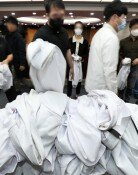Seoul should deliver denuclearization principle at inter-Korean talks
Seoul should deliver denuclearization principle at inter-Korean talks
Posted June. 10, 2013 08:10,
The South and North Korean authorities agreed to hold a ministerial level meeting in Seoul on Wednesday during their working-level contact that took place for the first time in two years and four months at the truce village of Panmunjom on Sunday. The upcoming meeting is expected to effectively restore inter-Korean relations that remained stalled throughout the five-year term of the Lee Myung-bak administration. Even though Sundays meeting constituted a working-level contact, the two sides seamlessly reached agreement, which is another positive sign.
The truthfulness of the upcoming meeting will be primarily dependent on the normalization of the Kaesong Industrial Park in the North. If machines in the industrial complex remain stopped for a long time during the monsoon season, they will become inoperable. Companies that invested in the complex are said to be on the brink of bankruptcy. Resuming the operation of the complex on the earliest date possible is important, but it would hardly suffice even if North Korean workers return to the complex and South Korean entrepreneurs enter and reopen their plants. This time, North Korea should guarantee that production activities in the complex will be stably operated regardless of political and military tension. Without such a guarantee, companies that invested in the Kaesong complex will have no choice but to seek exit strategies.
The first step will be hardly sufficient to meet expectations. It would be desirable for South and North Korea to take time in their bid to normalize overall inter-Korean relations. Resumption of South Koreans tours to Mount Kumgang in the North, resolution of the issue of South Korean prisoners of wars and South Koreans kidnapped by the North, and reopening of inter-Korean economic cooperation projects are issues that can make progress only when trust builds up between the two Koreas.
The fundamental reason for prolonged instability on the Korean Peninsula is the Norths development of nuclear weapons. In the U.S.-China summit on Sunday, leaders of the two countries agreed that North Korea cannot be considered a nuclear power, and that the Norths development of nuclear weapons cannot be accepted and tolerated. Two major principles regarding the North Korean nuclear standoff announced on Sunday will serve as the framework for Korean Peninsula policy of the two powers going forward. Notably, regarding inter-Korean dialogue, the U.S. is said to have conveyed to Seoul a message that The denuclearization issue should not be neglected as well.
With the leaders of the U.S. and China having strongly urged the Norths denuclearization, the South Korean government, the direct stakeholder of the nuclear issue, should inevitably mention this to the North during their talks. Recurring progresses and regressions in the bilateral relations since the inter-Korean summit in June 2000 was mainly due to the Norths development of nuclear weapons and long-range missiles. The South cannot and should not repeat failures of the past, which failed to block the North from developing weapons of mass destruction even after providing annual aid of 400,000 to 500,000 tons of rice and fertilizer.
At the foreign affairs and national security-related ministers meeting to be presided over by President Park Geun-hye on Monday, the government should meticulously fine-tune and coordinate how to address denuclearization as an agenda item in the upcoming inter-Korean meetings. To achieve peace on the Korean Peninsula, the South should clearly convey to the North that the denuclearization issue cannot be dodged. The inter-Korean ministerial meeting to be take place from Wednesday is the first step to forging inter-Korean ties by the Park administration.







